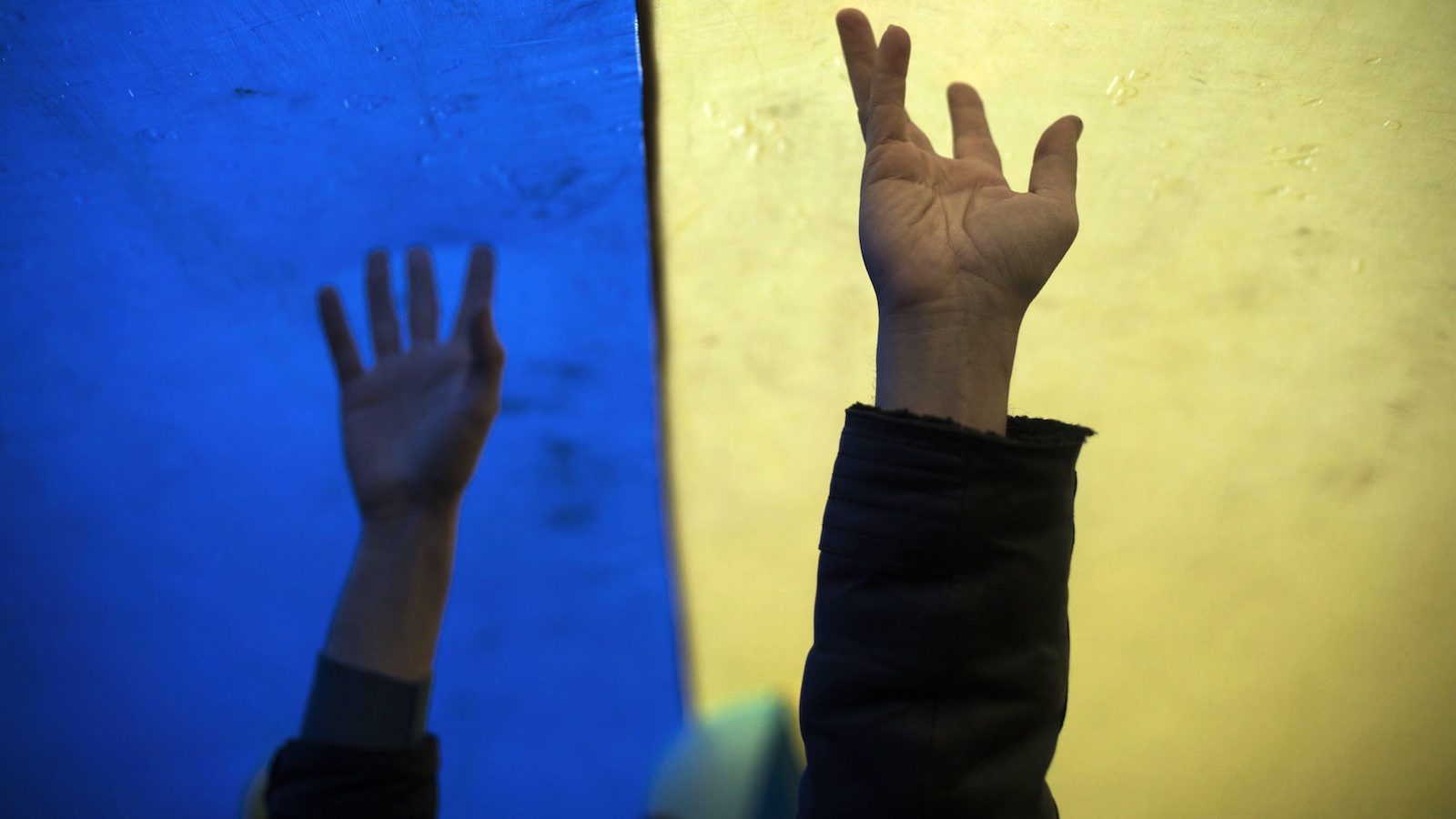Ukraine: democracy promotion by proxy
Paul Wells on the Harper government’s arms-length sequel to Rights and Democracy
Ukrainian demonstrators carry a giant Ukrainian flag during a pro Ukrainian demonstration in Donetsk, Ukraine, Thursday, April 17, 2014. Top diplomats from the United States, European Union, Russia and Ukraine reached agreement after marathon talks Thursday on immediate steps to ease the crisis in Ukraine. (AP Photo/Manu Brabo)
Share

Here’s a link to a PDF describing the International Republican Institute’s country program for Ukraine. Of course the IRI is active in Ukraine: created in 1983 as a counterpart to the National Democratic Institute, it’s one of the world’s leading democracy-promotion agencies, and the streets of Ukraine are where the next chapter in the book of freedom is being written.
You don’t have to look too closely at the fact sheet to notice something odd: it carries the logo of Canada’s Department of Foreign Affairs, Trade and Development. That’s because the largest contributor to the IRI’s Ukraine country program is DFAT-D. And while Canada’s government has not made a secret of this, they’ve gone through an elaborate version of the process they go through when they want something on the record but not actually noticed.
Here’s a speech Christian Paradis made in July to Ukrainian Canadians in Winnipeg. “I am pleased to announce that Canada will contribute over $8 million over three years to strengthen multi-party democracy,” he said. The news release that went out the same day mentioned IRI only in the “associated links” section at the end. The backgrounder, the third piece of the announcement, acknowledges IRI as the organization that will deliver the program (beginning — and this seems worth pointing out — in 2015, after the new year). The backgrounder says the money will help pay for:
• Training sessions aimed at helping political parties implement issues-based election campaigns;
• Roundtables involving representatives of political parties and civil society organizations to increase collaboration and address concerns related to governance;
• Leadership training for young local elected officials with a focus on civic engagement; and,
• Training in best practices for political parties and citizens to help increase the transparency and oversight of the central voter registry.
Why the rather limited acknowledgement? It could be because IRI has loose institutional links to the U.S. Republican Party, as NDI has to the Democrats, although both receive the bulk of their funding by an umbrella organization, the National Endowment for Democracy. Its board features a bunch of internationalist Rockefeller (or George H.W. Bush) Republicans, including Margaret Tutwiler and Brent Scowcroft. The board chairman is Sen. John McCain. But these links don’t directly affect the IRI’s work, and I suspect the government would have little trouble handling the tiny storm of fuss that people who don’t like Republicans would be in a mood to kick up over this. I suspect it’s simply that the Harper government has gotten into the habit of not saying much about anything, so it didn’t say much about this.
On to the substance of the thing. First, it’s worth noting that the money Paradis sort-of announced for IRI isn’t the only money Canada is spending for democracy promotion in Ukraine. In April I was in Warsaw when John Baird and Poland’s Radek Sikorski announced $9.2 million in Canadian funding for programs that will be delivered by two other agencies, Poland’s Solidarity Fund PL and the EU’s European Endowment for Democracy (EED). I mentioned that funding in this article, about European reaction to Vladimir Putin’s adventures in Ukraine. It was great fun chatting with Krzysztof Stanowski, the president of Solidarity Fund PL and a former tenant in the old Polish Communist regime’s jail cells, who regaled me with stories about dealing with risk-averse Canadian civil servants:
The Canadians are still clearly nervous about the democracy-promotion business, Stanowski said in an interview. As he was negotiating the new partnership with Canadian officials, he said, “I was asked, ‘Do you have risk-management procedures?’ ” He rolled his eyes. “The answer is, mainly, this is only about risk.” The risk is mostly borne by democrats in host countries, he added. “If we make mistakes, we will be taken out by our ambassadors. They will stay in jail.”
It’s worth noting the scale of the Canadian government’s activism in the democracy-promotion game in Ukraine: $8.1 million for IRI plus $9.2 million for Solidarity Fund PL and EED equals $17.3 million over three years. For comparison’s sake, the annual budget of Canada’s old Rights and Democracy agency was $11 million. This is a very big deal.
Why is it being delivered by other countries’ aid agencies? Partly, of course, because a few reporters, including your humble pundit, wrote about mismanagement at Rights and Democracy until it was a smoking crater. The Harper government is still skittish. Partly too, I suspect, because hiring established or fast-rising organizations to deliver these programs is quicker, and less prone to backseat driving by the opposition and press gallery in Ottawa, than renting offices in Montreal and delivering annual reports to Parliament.
Having argued, at the bottom of this March column, that the Harper government should get back into the democracy-promotion game in Ukraine, I’m pleased that they have done so, by whatever means works. And if the Harper government is a late convert to the virtues of multi-party democracy in the Ukraine context, well, they seem to have made up for it with new-found zeal.